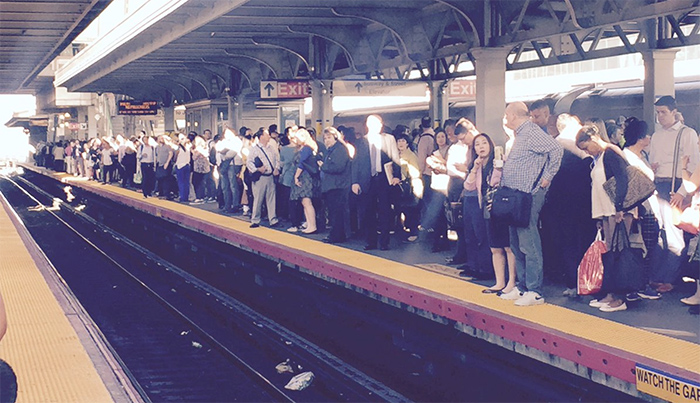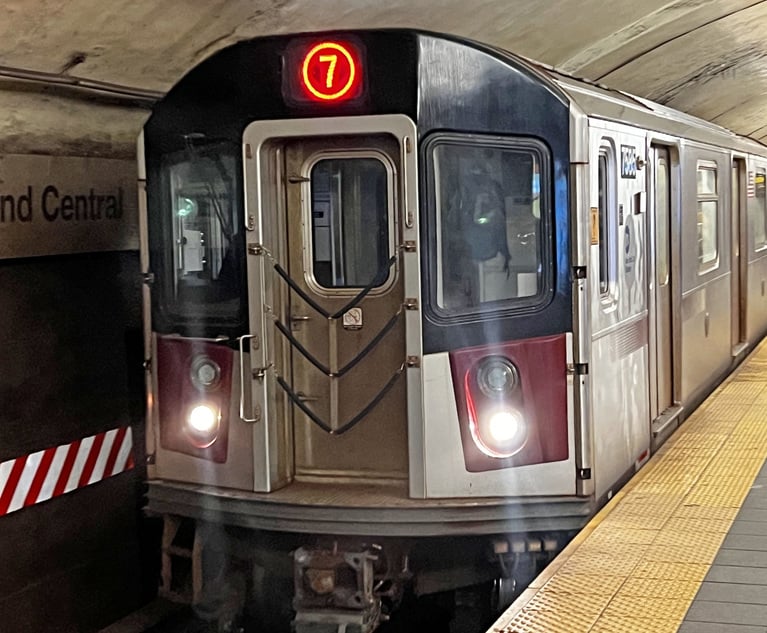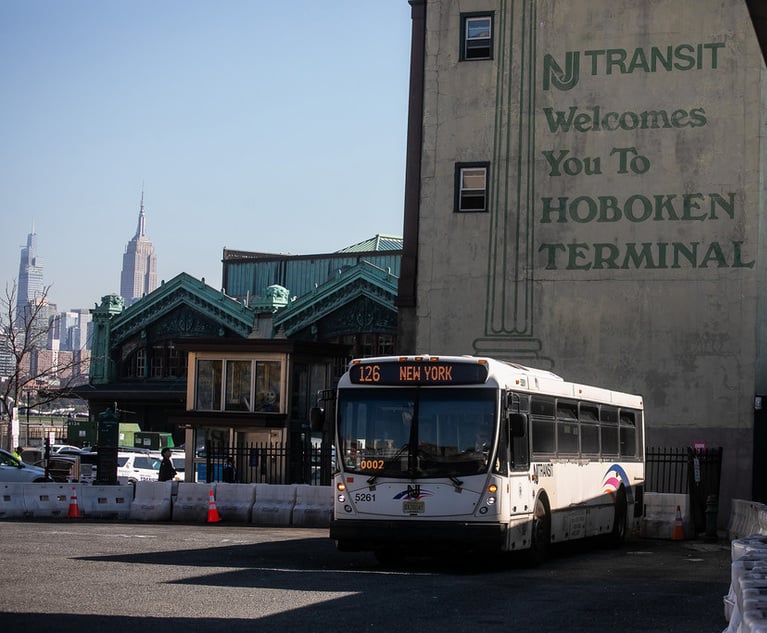LIRR Commuters' Suit May Continue Without Claim Notice, Judge Finds
Just as riding the Long Island Rail Road commuter train requires a ticket, bringing tort or contract claims against it typically requires a claim notice.
July 13, 2018 at 05:14 PM
3 minute read
 LIRR riders waiting for a train. Photo from court document Just as riding the Long Island Rail Road commuter train requires a ticket, bringing tort or contract claims against it typically requires a claim notice. But the plaintiffs in a proposed class action taking the Metropolitan Transportation Authority to task for bad service on the LIRR have found an alternate route—a narrow “public interest” exception to the requirement. The suit, filed last year during what Gov. Andrew Cuomo dubbed the “summer of hell” for frustrated straphangers as crews commenced track work at Penn Station in Manhattan, alleges that chronically delayed and cancelled trains have gotten the plaintiffs in trouble with their bosses, made them miss job interviews and caused them emotional and physical distress. The conditions are also putting commuters' lives at risk, said plaintiffs' attorney Paul Liggieri of the Derek Smith Law Group, himself a Long Island resident and an LIRR rider who says delays cause train platforms to become dangerously crowded, increasing the risk that someone could fall into the train bed. The MTA moved to dismiss the suit, asserting sovereign immunity and that the plaintiffs didn't take the usual step of serving a notice of claim. Nassau County Supreme Court Justice Antonio Brandveen agreed with the MTA that the lack of claim notice should be grounds for dismissing the plaintiffs' intentional infliction of emotional distress claim. But the judge said he agreed with the plaintiffs' argument that their breach of carriage contract and negligence claims should be subject to a public interest exception to the requirement, a “slim reed” created through appellate case law. Brandveen found that the plaintiffs seek to vindicate the public's interest that the MTA is following state statute requiring it to operate “safe and adequate” facilities and set a hearing to schedule discovery in the case; the MTA can reassert its sovereign immunity defense in a summary judgment motion, the judge said. Liggieri said he pushed for the public interest exception instead of litigating the notice of claim because “time is of the essence” to protect LIRR riders and that he saw the former as the quicker route. “I knew I had to file immediately to get answers from the LIRR,” he said. Liggieri also said he sees the ruling as potentially opening door for additional straphangers who are fed up with other New York City metro area commuter trains like the Metro North and the Amtrak from New Jersey.
LIRR riders waiting for a train. Photo from court document Just as riding the Long Island Rail Road commuter train requires a ticket, bringing tort or contract claims against it typically requires a claim notice. But the plaintiffs in a proposed class action taking the Metropolitan Transportation Authority to task for bad service on the LIRR have found an alternate route—a narrow “public interest” exception to the requirement. The suit, filed last year during what Gov. Andrew Cuomo dubbed the “summer of hell” for frustrated straphangers as crews commenced track work at Penn Station in Manhattan, alleges that chronically delayed and cancelled trains have gotten the plaintiffs in trouble with their bosses, made them miss job interviews and caused them emotional and physical distress. The conditions are also putting commuters' lives at risk, said plaintiffs' attorney Paul Liggieri of the Derek Smith Law Group, himself a Long Island resident and an LIRR rider who says delays cause train platforms to become dangerously crowded, increasing the risk that someone could fall into the train bed. The MTA moved to dismiss the suit, asserting sovereign immunity and that the plaintiffs didn't take the usual step of serving a notice of claim. Nassau County Supreme Court Justice Antonio Brandveen agreed with the MTA that the lack of claim notice should be grounds for dismissing the plaintiffs' intentional infliction of emotional distress claim. But the judge said he agreed with the plaintiffs' argument that their breach of carriage contract and negligence claims should be subject to a public interest exception to the requirement, a “slim reed” created through appellate case law. Brandveen found that the plaintiffs seek to vindicate the public's interest that the MTA is following state statute requiring it to operate “safe and adequate” facilities and set a hearing to schedule discovery in the case; the MTA can reassert its sovereign immunity defense in a summary judgment motion, the judge said. Liggieri said he pushed for the public interest exception instead of litigating the notice of claim because “time is of the essence” to protect LIRR riders and that he saw the former as the quicker route. “I knew I had to file immediately to get answers from the LIRR,” he said. Liggieri also said he sees the ruling as potentially opening door for additional straphangers who are fed up with other New York City metro area commuter trains like the Metro North and the Amtrak from New Jersey.This content has been archived. It is available through our partners, LexisNexis® and Bloomberg Law.
To view this content, please continue to their sites.
Not a Lexis Subscriber?
Subscribe Now
Not a Bloomberg Law Subscriber?
Subscribe Now
NOT FOR REPRINT
© 2025 ALM Global, LLC, All Rights Reserved. Request academic re-use from www.copyright.com. All other uses, submit a request to [email protected]. For more information visit Asset & Logo Licensing.
You Might Like
View All
Tensions Run High at Final Hearing Before Manhattan Congestion Pricing Takes Effect
4 minute read
So Who Won? Congestion Pricing Ruling Leaves Both Sides Claiming Victory, Attorneys Seeking Clarification
4 minute read
Decision of the Day: Administrative Court Finds Prevailing Wage Law Applies to Workers Who Cleaned NYC Subways During Pandemic

NY's Top Court Mulls Fate of Personal Injury Claims Against NJ Transit Corp.
Trending Stories
- 1We the People?
- 2New York-Based Skadden Team Joins White & Case Group in Mexico City for Citigroup Demerger
- 3No Two Wildfires Alike: Lawyers Take Different Legal Strategies in California
- 4Poop-Themed Dog Toy OK as Parody, but Still Tarnished Jack Daniel’s Brand, Court Says
- 5Meet the New President of NY's Association of Trial Court Jurists
Who Got The Work
J. Brugh Lower of Gibbons has entered an appearance for industrial equipment supplier Devco Corporation in a pending trademark infringement lawsuit. The suit, accusing the defendant of selling knock-off Graco products, was filed Dec. 18 in New Jersey District Court by Rivkin Radler on behalf of Graco Inc. and Graco Minnesota. The case, assigned to U.S. District Judge Zahid N. Quraishi, is 3:24-cv-11294, Graco Inc. et al v. Devco Corporation.
Who Got The Work
Rebecca Maller-Stein and Kent A. Yalowitz of Arnold & Porter Kaye Scholer have entered their appearances for Hanaco Venture Capital and its executives, Lior Prosor and David Frankel, in a pending securities lawsuit. The action, filed on Dec. 24 in New York Southern District Court by Zell, Aron & Co. on behalf of Goldeneye Advisors, accuses the defendants of negligently and fraudulently managing the plaintiff's $1 million investment. The case, assigned to U.S. District Judge Vernon S. Broderick, is 1:24-cv-09918, Goldeneye Advisors, LLC v. Hanaco Venture Capital, Ltd. et al.
Who Got The Work
Attorneys from A&O Shearman has stepped in as defense counsel for Toronto-Dominion Bank and other defendants in a pending securities class action. The suit, filed Dec. 11 in New York Southern District Court by Bleichmar Fonti & Auld, accuses the defendants of concealing the bank's 'pervasive' deficiencies in regards to its compliance with the Bank Secrecy Act and the quality of its anti-money laundering controls. The case, assigned to U.S. District Judge Arun Subramanian, is 1:24-cv-09445, Gonzalez v. The Toronto-Dominion Bank et al.
Who Got The Work
Crown Castle International, a Pennsylvania company providing shared communications infrastructure, has turned to Luke D. Wolf of Gordon Rees Scully Mansukhani to fend off a pending breach-of-contract lawsuit. The court action, filed Nov. 25 in Michigan Eastern District Court by Hooper Hathaway PC on behalf of The Town Residences LLC, accuses Crown Castle of failing to transfer approximately $30,000 in utility payments from T-Mobile in breach of a roof-top lease and assignment agreement. The case, assigned to U.S. District Judge Susan K. Declercq, is 2:24-cv-13131, The Town Residences LLC v. T-Mobile US, Inc. et al.
Who Got The Work
Wilfred P. Coronato and Daniel M. Schwartz of McCarter & English have stepped in as defense counsel to Electrolux Home Products Inc. in a pending product liability lawsuit. The court action, filed Nov. 26 in New York Eastern District Court by Poulos Lopiccolo PC and Nagel Rice LLP on behalf of David Stern, alleges that the defendant's refrigerators’ drawers and shelving repeatedly break and fall apart within months after purchase. The case, assigned to U.S. District Judge Joan M. Azrack, is 2:24-cv-08204, Stern v. Electrolux Home Products, Inc.
Featured Firms
Law Offices of Gary Martin Hays & Associates, P.C.
(470) 294-1674
Law Offices of Mark E. Salomone
(857) 444-6468
Smith & Hassler
(713) 739-1250






